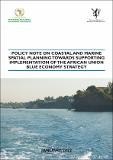Policy Note on Coastal and Marine Spatial Planning towards supporting Implementation of the African Union Blue Economy Strategy

(en=English; ar=Arabic; fr=French; pt=Portuguese)
Language
enDate
2022-01Authors
Fulanda, Bernerd Mulwa Dr.
Seisay Dr., Mohamed
Item Usage Stats
118
views
views
33
downloads
downloads
Abstract
Africa is abundantly blessed with a coastline of over 30,000 Km, adjacent to vast expanse of oceans
and seas. Maritime zones under Africa’s jurisdiction total about 13 million square Kilometers including
territorial seas and approximately 6.5 million square Kilometers of the continental shelf. The continent
is also endowed with huge networks of rivers, lakes, floodplains, waterways, catchments and wetlands
with massive potential for socio-economic growth, advancement and prosperity of the continent. These
natural aquatic endowments represent significant opportunities for social and economic development
much of which remains untapped, unexploited and underutilized. Some of these opportunities include
fisheries, aquaculture, transport, energy and minerals, tourism, rural economic development and increased ecosystem conservation and environmental sustainability.
Description
In a bid to fully harness these aquatic endowments for the benefits of the continent, the African Union
developed the Africa Blue Economy Strategy. Noting that the Blue economy has diverse components, the
2 African Union - Inter-African Bureau for Animal Resources strategy focuses on the following five thematic areas of the blue economy, considered as essential and crucial to blue economy growth, development and prosperity in Africa: I. Fisheries, aquaculture, conservation and sustainable aquatic ecosystems II. Shipping/transportation, trade, ports, maritime security, safety and enforcement III. Coastal and maritime tourism, climate change, resilience, environment, infrastructure IV.
Sustainable energy and mineral resources and innovative industries V. Policies, institutional and governance, employment, job creation and poverty eradication, innovative financing. Maritime Spatial Planning (MSP) is identified as a tool for better coordination and synergy in blue economy development. In recent years, some AU Member States have initiated the MSP process as part of their national developmental programs but the implementation still remains a significant technical challenge for a majority of the AU Member States.